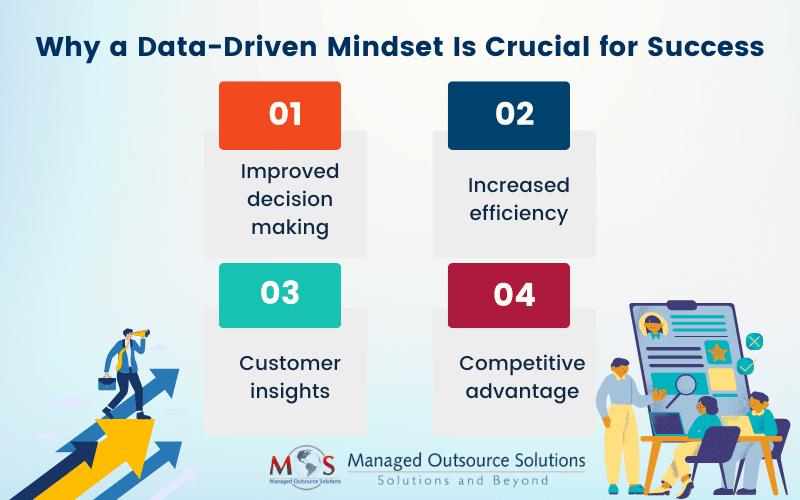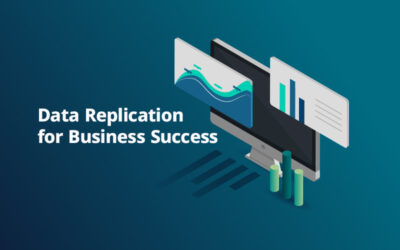As data continues to grow exponentially, effectively harnessing this resource is crucial for businesses aiming to make informed decisions and maintain a competitive edge. Adopting a data-driven mindset is essential for both survival and growth in today’s fast-paced environment. Data cleansing services and data analytics play a key role in unlocking the power of data and enabling businesses to make informed decisions.
A data-driven mindset involves using data rather than intuition or guesswork to guide decisions, strategies, and actions. Organizations that prioritize data can make informed choices that lead to better outcomes. This post explores why a data-driven mindset is important and how adopting it helps businesses stay competitive, grow, and succeed.
Ensure your data is accurate and actionable with our data cleaning services!
Importance of a Data-Driven Mindset
Collecting and analyzing data enables businesses to better adapt to changing market trends, improve customer satisfaction and retention, fend off competition, and meet regulatory requirements. However, according to recent reports, businesses are slow to adopt data-driven decision making. Time pressure to make important decisions is forcing many leaders to rely on intuition rather than data-driven insights, according to a Confluent study (Technology Magazine, Oct 2024). The report noted that three in five business leaders (61%) frequently make ‘snap decisions’ without reviewing available data.
Ignoring data when making decisions can have dire consequences. According to a 2021 Alation report, 97% of data leaders acknowledged that their companies had experienced negative outcomes from neglecting data-ranging from missed revenue opportunities to inaccurate performance forecasts and misguided investments (Forbes, Aug 2024).
A data-driven mindset is important for the following reasons:
Improved decision making: By relying on data, businesses can correctly identify trends, measure performance, and understand customer behavior. This results in more effective decisions.
Increased efficiency: Analyzing data can identify inefficiencies in processes, helping businesses address them, restructure operations, and reduce costs.
Customer insights: Data analytics can help businesses understand customer preferences and behaviors and develop personalized marketing strategies to improve customer experiences.
Competitive advantage: Companies that harness data effectively can predict market changes, respond swiftly, and stay ahead of the competition.
The Role of Analytics in Data-Driven Decision Making
Data-driven decision making (DDDM) involves collecting data, analyzing it, and using the insights to make informed decisions that align with goals and objectives. With the advent of artificial intelligence (AI) and advanced computing hardware, data now holds more information than ever. Analytics enables extraction of patterns and trends from vast datasets, uncovering, providing businesses with actionable insights for DDDM.
Consider an e-commerce retailer that adopts a data-driven mindset. By analyzing customer purchase history, website traffic, and engagement metrics, the retailer can make informed decisions about inventory management, marketing strategies, and product offerings.
Suppose the company notices a decline in sales during certain months of the year. By examining sales data, website traffic, and customer feedback, they find that seasonal trends significantly influence purchasing behavior. They also notice that certain products are frequently abandoned in shopping carts.
With these insight, the company decides to implement targeted marketing campaigns and strategies during slow months to address their problems. This includes offering promotions on popular items that are often abandoned and also ensuring that high-demand products are available during peak times. Better results follow, with the business experiencing an increase in sales during previously slow months, improved customer satisfaction, and lower cart abandonment rates.
Adopting a Data-Driven Mindset
As the above example shows, data-driven decision making offers distinct benefits:
- Enhanced processes
- Strengthened competitive position
- Improved human capabilities to anticipate trends and take pre-emptive actions
- Integration of data into products and services
- Innovative products and services derived from better customer and market insights
- Better strategic planning
- Enhanced risk management
Adopting a data-driven mindset is necessary to process, interpret and act on data to leverage the power of analytics.
Here’s what every organization needs to know for developing a data-driven culture:
- Align Data with Strategy
Evaluate data within the context of overarching business goals to ensure it drives meaningful outcomes.
- Prioritize Data Accuracy and Relevance
Analyze data meticulously to confirm its accuracy, relevance, and reliability of sourcing.
- Integrate Data in Decision-Making
Keep data at the forefront throughout every stage of the decision-making process.
- Recognize Data Limitations
Understand the constraints and potential gaps in the data to make informed interpretations.
- Promote Data-Driven Decisions
Highlight the role of data in shaping decisions across the organization to build a data-centric culture.
- Hold Teams Accountable
Ensure team members are responsible for decisions and actions based on data insights.
- Share Insights Proactively
Actively disseminate findings and data-driven insights to foster collaboration and transparency.
- Ask Questions, Avoid Assumptions
Challenge speculation by asking insightful questions and staying open-minded about data interpretations.
- Adopt a Growth Mindset
Approach data with a perspective geared toward learning, innovation, and continuous improvement.
- Consider Biases
Examine personal biases and assumptions that may skew the interpretation of data.
- Minimize Cognitive Biases
Focus on objectivity by recognizing and reducing cognitive biases in the decision-making process.
Role of AI in Data-Driven Decision Making
Businesses can now leverage artificial intelligence (AI) and machine learning to analyze data and make business decisions. However, the Forbes article highlights that while AI could handle low-level, tactical decisions more efficiently, human scrutiny is crucial for strategic data-driven decision-making. “Human judgment, which balances broader context, situational nuances, ethical considerations, empathy, and compassion, remains crucial”, notes the article. Humans must examine not only the data but also the logic and criteria that AI tools use to make their recommendations.
Achieve the Best Results with the Right Support
Implementing a data-driven approach requires robust support systems to succeed. Legacy IT infrastructures often hinder advancements in data sourcing, storage, and analysis, particularly when managing complex unstructured data. Along with modern IT solutions, support from a reliable business process outsourcing company can go a long way in overcoming these challenges. It will enable organizations to identify and prioritize critical data for analytics, enhance data quality by filling gaps, synchronizing and merging redundant information, and implementing data cleansing to ensure accuracy and reliability in analytics efforts.





